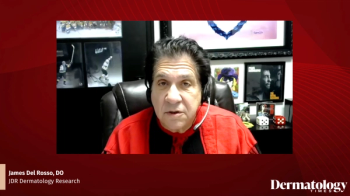
Guselkumab, Ustekinumab Led to 2 Years of Sustained Improvements in Patients With Psoriasis
In the PERSIST study, improvements were sustained through week 104.
In week 104 of the non-interventional, prospective PERSIST study,1 guselkumab and ustekinumab not only led to improvements in adult patients with moderate to severe psoriasis but did so on a long-term basis, providing patients with sustained improvements.
The multicenter study sought to determine the long-term efficacy, safety, and impact on health-related quality of life (HRQoL) of the drugs in a real-world setting.
Adult patients with amoderate to severe psoriasis diagnosis were enrolled in the study between January 2018 and May 2019, with 279 completing the study through week 28. By this same time, 56.8% of participants achieved the study’s primary endpoint: a Dermatology Life Quality Index (DLQI) score of ≤ 1. Additionally, 55.3% of participants had achieved a Psoriasis and Area Severity (PASI) score of PASI 90, or significant improvement, by week 28.2
Researchers also reported that the drugs were well-tolerated and effective after 52 weeks of treatment. No new safety signals were observed during this time. Both PASI 90 and PASI 100 responses experienced significant improvement from week 28 to week 52, and 64.6% of patients were able to achieve a DLQI score of ≤ 1 by week 52.3
This new release of data1 through week 104 examines the real-world efficacy and safety of guselkumab and ustekinumab over a 2-year period. In this evaluation, researchers divided data into separate guselkumab (n=302) and ustekinumab (n=313) cohorts.
By week 104, researchers reported that 64.7% of patients in the guselkumab cohort had achieved PASI 90, while 63.6% in the same cohort achieved a DLQI 0/1 score. Among participants in the ustekinumab cohort, 54.6% had achieved PASI 90, and 64.4% achieved DLQI 0/1. Furthermore, researchers found that biologic-naïve patients receiving guselkumab had higher response rates than biologic-experienced patients. Both treatment cohorts achieved high levels of quality of life responses.
“Data from the real-world PERSIST study demonstrate improvements in physician-assessed and patient-reported outcomes with ustekinumab and guselkumab in patients with psoriasis that are sustained for up to 2 years, with no new safety signals identified,” according to Gerdes et al. “An ad hoc exploratory analysis of outcomes with ustekinumab versus guselkumab using propensity matching demonstrated greater improvements in PASI outcomes in guselkumab recipients. Improvements were greatest in those who were biologic naïve versus biologic experienced, and this was more pronounced in guselkumab than ustekinumab recipients, thereby highlighting the value of early intervention with guselkumab.”
References
- Gerdes S, Hoffmann M, Asadullah K, et al. Effectiveness, safety and quality‐of‐life effects of guselkumab and ustekinumab in patients with psoriasis: week 104 results from the non‐interventional, prospective, German multicentre PERSIST study. J Eur Acad Dermatol Venereol. Published online July 18, 2023.
doi:10.1111/jdv.19296 - Gerdes S, Bräu B, Hoffmann M, Korge B, Mortazawi D, Wiemers F, et al. Real-world effectiveness of guselkumab in patients with psoriasis: health-related quality of life and efficacy data from the noninterventional, prospective, German Multicenter PERSIST trial. J Dermatol. 2021; 48: 1854– 1862.
- Gerdes S, Asadullah K, Hoffmann M, Korge B, Mortazawi D, Wegner S, et al. Real-world evidence from the non-interventional, prospective, German multicentre PERSIST study of patients with psoriasis after 1 year of treatment with guselkumab. J Eur Acad Dermatol Venereol. 2022; 36: 1568– 1577.
Newsletter
Like what you’re reading? Subscribe to Dermatology Times for weekly updates on therapies, innovations, and real-world practice tips.










